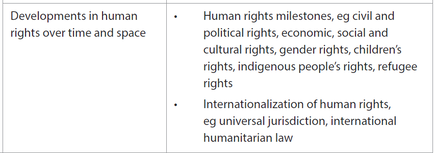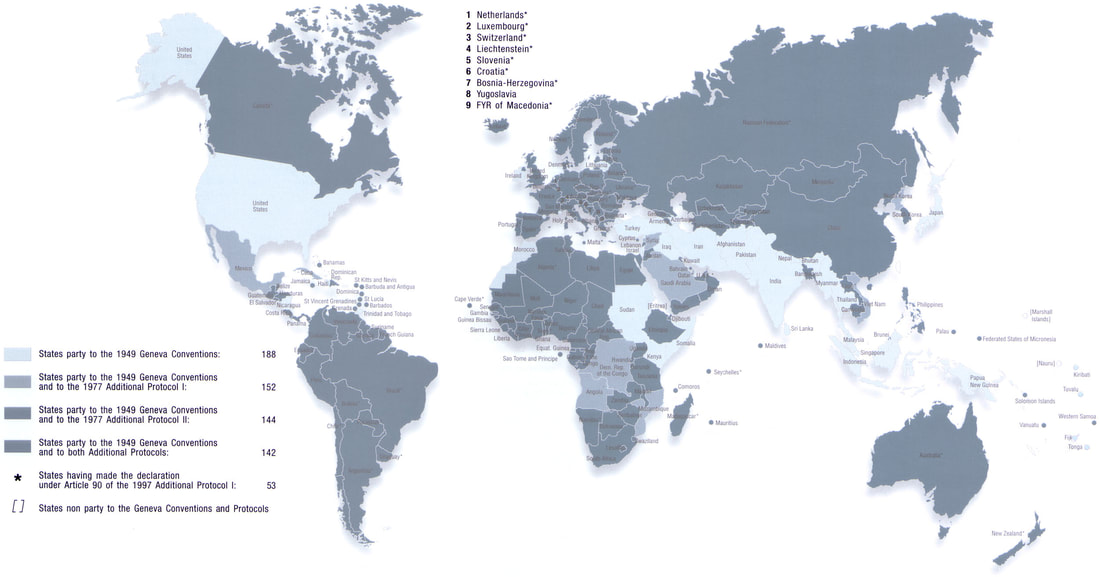Development of Humanitarian law
Along with the UDHR the post Second World War settlement aimed to develop a set of norms that would avoid the horrors of the war being repeated, specifically abuses to Prisoners of War (POWs), genocide and other War Crime.
From this discussion the Geneva convention emerged. Read the first article on the development of Humanitarian law and the answer the key questions to build up your notes.
From this discussion the Geneva convention emerged. Read the first article on the development of Humanitarian law and the answer the key questions to build up your notes.
Challenges to Humanitarian Law
|
Video 1:
How does the report state that the humanitarian law has been breached in the Syria conflict. Which actors are identified in the video? What recommendations are given? |
|
|
|
Video 2:
What is the message about the efficacy of Humanitarian Law? |
Development to Humanitarian Law 1: The Geneva Conventions
|
As discussed in the article on humanitarian law, the Geneva conventions form the main plank of this law. These are four conventions ruling on the main aspects of how to act in a conflict related to: protection of soldiers and sailors, protection of prisoners of war and protection of civilians.
Watch the video first, this note down how the conventions emerged over time and how they have been challenged. |
|
|
Now conduct some research:
1. Pick one of the four Geneva Conventions. 2. Read in detail about it - what does it state, who should be protected, under what conditions. 3. Find out an example of where this convention has been breached in recent years, simply googling a recent conflict and geneva convention article ... would work. Look at the conflict in Syria, Sudan, DRC or any other hotspot to try and get some detail. 4. Be prepared to deliver a verbal report like in the UN video earlier. |
LINK TO THEORY:
The development of Humanitarian Law should be prompting the following questions on theory.
- How has humanitarian law a challenge to the sovereignty of states.
- How do the concepts of power, legitimacy and interdependence relate to humanitarian law?
- How does the idea of humanitarian law follow the ideas of universalism?
- How has humanitarian law a challenge to the sovereignty of states.
- How do the concepts of power, legitimacy and interdependence relate to humanitarian law?
- How does the idea of humanitarian law follow the ideas of universalism?
Other Human Rights / Humanitarian Law milestones:
As further development of your notes research into either the Convention on the Rights of the Child or the Convention on the elimination of discrimination against women.
Note down:
- What the convention states.
- Who it seeks to protect.
- How it seeks to protect them.
- The tools available to protect them.
- Which state(s) have signed up to these conventions
- The ways in which these conventions are challenged.
Note down:
- What the convention states.
- Who it seeks to protect.
- How it seeks to protect them.
- The tools available to protect them.
- Which state(s) have signed up to these conventions
- The ways in which these conventions are challenged.
Issues with the CRC
International Human Rights Law has been widely touted as providing key guidelines on the rights of vulnerable groups. The CRC is an example of where this focus has been achieved in some areas but still is not always followed universally despite the legal importance of these treaties.
|
CEDAW in reality - Reservations and Bahrain:
Bahrain (and other states) is a nice example of the problem of implementing International Human Rights Laws.
According to ratification these conventions are legally binding and equal to domestic law. The video below explains this. However in Bahrain when signing the convention the King noted reservations to certain articles, these are articles that conflict with Sharia law and therefore would not be followed. There is more detail on this in the links below, page 24 (sect 3) of the MOFA declaration and page 32 (on reservations) give more detail on these. |
Extension: Other Human Rights Treaties
|
The link to the left takes you to the UN page that has links to all International Human Rights treaties. Although you really only need a couple of examples of treaties (CEDAW / CRC) it might be interesting to look over what other treaties have been agreed.
Same focus as previously: - Who agreed to the treaty? - What was agreed? - How does the treaty protect human rights? - What limitations are there of the treaty? |
Sample Paper 2 question:
|
Now you have a working knowledge of at least two human rights conventions you can start to think about planning a classic essay on this topic. First, use the pre planning article to give you some context and ideas for you essay:
|
Discuss the claim that developments in human rights over space and time have enhanced the power of Human Rights to challenge the actions of states.
Breaking the question down:
Key concepts:
Actors involved in the question:
What human rights developments have there been
What has been the impact of these on states?
What theoretical perspectives are there on the issue?
Key concepts:
Actors involved in the question:
What human rights developments have there been
What has been the impact of these on states?
What theoretical perspectives are there on the issue?
Potential ideas for case studies to support two perspectives:

